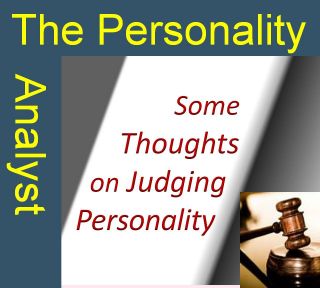Attention
On Judging and Being Judged Over the Holidays—2013 Edition
How we react to other people's comments about us
Posted November 26, 2013

This is the fourth year that I’ve written about judging people during the holiday season (earlier versions were in 2008, 2009, 2010); it's become a tradition.
In the coming weeks, many of us will celebrate the holidays of faiths and traditions from around the world. Our families and friends will be on our minds—and sometimes in our homes. We’ll make judgments of other people, some of which we’ll conceal, and others of which we’ll express—to varying effect on the people who hear us. Everyone around us will also be making, concealing, and communicating some judgments, including ones about us. This year, I’m going to focus on being judged by others—an experience that we all have--we are both judges and judged.
Let me start with the claim that all judgments of our personalities, no matter how carefully we make them and no matter how accurate they are, are imperfect. They are inevitably imperfect because our judgments are particularistic, reductionistic and simplistic, whereas the reality is that our personalities are general and whole.
Most judgments are particular, focusing in on one single part of a person. Examples of negative judgments include that we are too lazy, poorly dressed, late. Judgments such as these end up being reductionistic in the sense that they reduce the whole person to one of her parts: her slovenly appearance, or tardiness. For the same reason, such judgments are simplistic because a person is more complex than this. Even those exceptional cases in which we judge the whole person—“you’re the best” or “you’re no good”—nonetheless reduce the person to a single simple quality.
Here’s a relevant psychological fact: Our short-term memory can hold somewhere between 4 and 7 unrelated facts at a time. Although we can raise that number under certain circumstances (and it is lower under other conditions), the number 7 serves as a good enough figure for how many things we can remember at a particular time.
The number 7 becomes relevant because there’s a lot more to each of our personalities than just seven things—there are, for example, 400 parts of personality commonly discussed by personality psychologists. Therefore, when people comment about you (or me), they are usually drawing attention to one part of us. If their comment was a criticism, they might have said that we were lazy, or always late, obnoxious, ill-tempered, or that we dressed poorly. They are drawing attention typically to one part of our personality or one choice we’ve made. But what about all the other parts?
It’s easy for us to get overly-focused on the one point of criticism. Our attention has a way of singling in, laser-like, on the issue at hand. Most of us, I suspect, feel that we’ve become our flaw. And, if the comment was said among like-minded people, perhaps everyone’s attention is directed collectively to our alleged limitation. But that single flaw is not the reality—or, at least, not the reality that counts the most. Rather we are whole people.
When I find my attention drawn and narrowed to a single one of my personal limitations, it’s as if my consciousness is altered and that’s all I can see—but that’s not a helpful way to be. That constricting of consciousness, focused like a microscope on a personal flaw distorts my self-image. If I feel shame as well--which often accompanies thinking about a shortcoming—I’m more likely to deny my flaw (if I can), to react angrily to the person who pointed it out even if I don't express my anger directly, or to feel depressed and helpless in the face of my own limitations.
So, rather I take a breath to calm down, then adjust my attention, and hope everyone adjusts their attention as well. Each of us is a rich, multifaceted individual, a person who carries out many different roles and responsibilities as best we can, and each of us needs the help of others. In that broader context, my flaw may not seem so serious and it is easier to accept what may feel like a personal defect: the comment represents another person’s perspective on who I am, and though there may be truth to it, other opinions are possible. If my attention is broad enough, and I feel connected to other people, I’ll also feel humility—a oneness with other human beings based on the sense that each of us is imperfect.
By broadening our perspective when we are criticized, we reclaim our wholeness. What we do next, of course, depends upon what the comment was, it’s meaning to us and others, and whether we regard it as needing a response. If the intent of the person making the judgment was angry or competitive and meant to hurt us, we might want to engage in the gentle art of verbal self-defense. If the remark was meant to help us, we might want to consider whether there’s some helpful information in it that we can use. And if the remark seems a bit off-the-wall, well, maybe no response is needed. It helps to remember that most of us have, at some time or another, made a critical remark, have made helpful remarks, and have offered thoughts that missed the mark.
When I’ve discussed judging during the holidays in earlier years, I’ve emphasized how we judge other people. The other side of this reality is that we all are targets of judgments as well. Being a “good target”—keeping our cool, using the feedback if it is indeed helpful, and responding gently to anyone who seems to have gone too far—is another key part of the judging equation, and something that, if we do it well, can help us and those around us enjoy the holidays whatever may come our way.
References
“a psychological fact…” Cowan, N. (2000). The magical number 4 in short-term memory: A reconsideration of mental storage capacity. Behavioral and Brain Sciences, 24, 87-185.
Miller, G. A. (1956). The magical number seven, plus or minus two: Some limits on our capacity for processing information. Psychological Review, 63, 81-97.
“400 parts of personality” see p. 832 of Mayer, J. D. (1995). A framework for the classification of personality components. Journal of Personality, 63, 819-878.
Copyright © 2013 John D. Mayer




